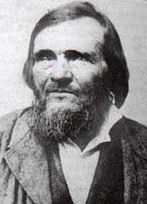I recently wrote about “Calvinism and the Roots of the Missionary Movement,” in which I discussed the powerful (and to some, counter-intuitive) influence of Calvinism on early Baptist missionaries. There’s a flip-side to that story, which is the largely Calvinist antimission movement of the 1820s and 1830s. Baptists and other evangelicals founded a number of missions-sending organizations in the first two decades of the nineteenth century, which precipitated a backlash among certain Baptists who opposed the work of the Baptist Board of Foreign Missions and other such agencies.
Why in the world, we may ask, would any Baptist oppose missions? I’ve been studying the antimission Baptists for a history of Baptists in America I am writing with my colleague Barry Hankins (contract with Oxford University Press). I must admit that I am not favorably disposed toward the antimission Baptists, as someone who both supports missions and has been on mission trips. (Heck, I once even went on a mission trip with a parachurch agency, The Navigators, which the antimission folks really wouldn’t like!) But the task of the historian is to understand all people on their own terms, and while I still don’t agree with them, I can see where the antimission Baptists were coming from.
The two major factors driving antimissionism were radical biblicism and anti-elitism. Most of the leading antimission voices are not well known – John Leland (Thomas Jefferson’s friend who delivered the president the “mammoth cheese” in 1802 – more on that here) is the best known today, but others like Daniel Parker and Joshua Lawrence were more vocal at the time. The antimission critics were suspicious of the missions agencies because Scripture did not sanction or contemplate them. It is a classic debate, not unlike our debates over the Constitution: if the text is silent, does that give us permission to act, or forbid us to act? Antimissionists said that the silence of Scripture prohibited the newfangled organizations. The early church didn’t need them, and the gospel had gone forth in power without them. Why should we depart from the simplicity of the New Testament model, they asked?

Antimission advocates especially thrived in the rural and relatively impoverished areas of the south and frontier west, and there was a clear class dynamic to their suspicions, as well. Many of the missions advocates were college-educated northeasterners, and forty years before the Civil War, antimissionists already had a well-cultivated suspicion of Yankees and their agendas. They did not appreciate unfamiliar “missionaries” trying to get financially-strapped churches to give money for Burma or other faraway destinations. The gospel would certainly go out to those people in time, through the evangelistic ministry of individual pastors and churches. But the antimissionists did not trust these “northern beggars,” and saw no requirement in Scripture that churches should support them.
Some historians have made a great deal out of the “hyper-Calvinism” of the antimissionists, and that theology did play a greater role in the antimissionists’ chief institutional legacy, the Primitive Baptist churches. Daniel Parker, for example, taught a peculiar (and many thought heretical) “Two Seed in the Spirit” doctrine of election, but his view was not held widely among early antimissionists. More commonly, the antimissionists were concerned that the missions agencies, as well as novel revivalist tactics such as the “anxious bench”(!), might undermine Baptists’ understanding that conversion depended totally on God’s power and sovereign will. This was largely an intra-Calvinist Baptist debate, however. By the 1840s, the antimission Baptists had drawn away as many as 68,000 Baptists from the pro-missions churches. Over time, the antimission movement became institutionalized in the Primitive Baptist churches, but they fell far behind missions-oriented Baptists in adherents by the beginning of the twentieth century. Yet most southern and midwestern towns, including Waco, Texas, still have at least one Primitive Baptist church.
For further reading, see among others the writings of Betram Wyatt-Brown on the antimission Baptists, including “Paradox, Shame, and Grace in the Southern Backcountry,” ch.5 of Wyatt-Brown’s The Shaping of Southern Culture (2001).












